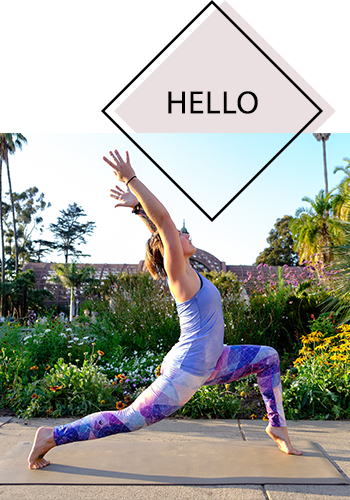4 Pillars of True Happiness
/On living a happy and fulfilling life.
Read MoreDiscover resilience through yoga and meditation.
Read MoreOn bringing compassion into your day.
Read MoreTwo years ago, I launched my latest book…
Read MoreI’m 1 of 73 in an Executive MBA program.
Read MoreIf you’re a new yoga teacher and you want to get from nervous to confident faster (and with ease rather than stress), a yoga script can help.
Read MoreA guide for new yoga teachers to help you find your groove.
Read MoreWriting myself some reminders for the next time I feel like this.
Read MoreNew yoga teachers, this one is for you.
Read MoreYoga photo shoots have been a special part of my practice over the last decade. I’m always amazed at what memories come flooding in when I look back…
Read MoreI’m loving this pocket-sized book of eco-spiritual reflections, meditations & affirmations.
Read MoreI recently discovered the Get Sound app… it’s a game changer for relaxing yoga playlists. Read this post to learn more about how it works.
Read MoreAn incredible book about powerful healing modalities to process trauma.
Read More
To perform at your best as an athlete, it is important that recovery is incorporated into your training plan. Not leaving sufficient time to recover between training sessions or competitions can lead to poor performance. To ensure optimal recovery, it's essential to explore various interventions and their effects on fatigue, muscle injury, and overall performance. Here are some tips to help you recover!
Sleep is essential for athletes because it facilitates both physical and mental recovery from workouts or competitions. Adequate rest periods between exercises are also important for preventing fatigue or burnout from overtraining. It is recommended that athletes get at least 8 hours of sleep per night, but 10-12 hours may be needed depending on their individual needs and performance goals.
Active recovery techniques are methods used by athletes to restore physiological processes after exercise or competition without causing further strain on their muscles or joints. These techniques can include stretching, yoga, foam rolling, and light cardio activities such as swimming or jogging. These activities promote blood flow throughout the body and help reduce soreness while improving flexibility and range of motion—all critical elements of successful athletic performance.
CBD products have become increasingly popular among athletes due to their potential health benefits related to pain relief and inflammation reduction—two common issues that arise from intense exercise or competition regimens. In addition to these effects, research suggests that cbd may also boost moods and improve focus levels which can aid an athlete's recovery process overall by making it easier to stick with a consistent routine over time (as opposed to feeling burned out). However, it should be noted that using cbd products should be done so under the guidance of a healthcare professional in order to ensure proper dosage recommendations are met in order to avoid any potential side effects associated with excessive consumption of this substance.
Stress is unavoidable when it comes to competitive sports; however, if not managed properly, it can lead to negative impacts on both physical and mental well-being. Therefore, incorporating stress management strategies into an athlete's lifestyle can have positive long-term effects on their overall performance by reducing anxiety levels and improving focus during workouts or competitions—which in turn helps promote quicker physical recovery times afterward as well as better overall emotional well-being within the individual themselves. There are many different ways athletes can manage stress levels, such as meditation, journaling, and participating in activities like yoga or tai chi—all of which should be discussed with a healthcare provider before beginning in order for one to determine what works best for their own personal needs/goals related to athletic performance improvement.

Overall, incorporating a combination of nutritional strategies, adequate sleep and rest periods, active recovery techniques such as stretching or yoga, the use of CBD products under professional guidance, and stress management strategies can help high-performance athletes achieve optimal levels of physical and mental well-being needed for success in their fields. By taking advantage of these tools available to them—whether through personal experimentation or with the assistance of healthcare professionals—athletes can ensure that they are adequately recovering from strenuous exercise or competition regimens while also reducing any associated risks related to overtraining.
Reflections on slowing down to savor the moment.
Read MoreChanging up your fitness routine for spring?
Read MoreI recently had a surgery to remove a basal cell carcinoma lesion. In this essay, I share about the experience and the healing process. (Fair warning/ heads up: the content here includes descriptions of the surgery and images of my scar. If you’re sensitive or squeamish, please be advised.)
Read MoreAlive in the Fire is a blog inspired by practicing yoga mindfully, teaching from the heart, giving hugs, and living a badass life.

Alive in the Fire is a blog inspired by practicing yoga mindfully, teaching from the heart, giving hugs, and living a badass life.
Donations help keep the programs and yoga classes at Alive in the Fire available to those in need. Your generosity is greatly appreciated!

Copyright 2017. All rights reserved - Alive in the Fire. Design by Hello Big Idea.